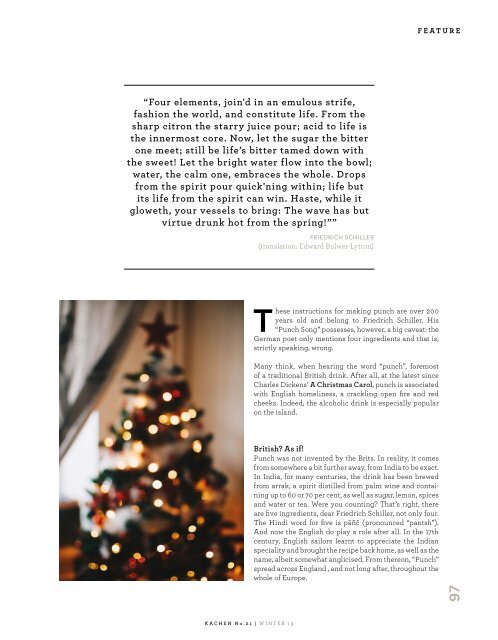KACHEN #21 (Winter 2019) English edition
- No tags were found...
You also want an ePaper? Increase the reach of your titles
YUMPU automatically turns print PDFs into web optimized ePapers that Google loves.
FEATURE<br />
“Four elements, join'd in an emulous strife,<br />
fashion the world, and constitute life. From the<br />
sharp citron the starry juice pour; acid to life is<br />
the innermost core. Now, let the sugar the bitter<br />
one meet; still be life’s bitter tamed down with<br />
the sweet! Let the bright water flow into the bowl;<br />
water, the calm one, embraces the whole. Drops<br />
from the spirit pour quick'ning within; life but<br />
its life from the spirit can win. Haste, while it<br />
gloweth, your vessels to bring: The wave has but<br />
virtue drunk hot from the spring!””<br />
FRIEDRICH SCHILLER<br />
(translation: Edward Bulwer-Lytton)<br />
These instructions for making punch are over 200<br />
years old and belong to Friedrich Schiller. His<br />
“Punch Song” possesses, however, a big caveat: the<br />
German poet only mentions four ingredients and that is,<br />
strictly speaking, wrong.<br />
Many think, when hearing the word “punch”, foremost<br />
of a traditional British drink. After all, at the latest since<br />
Charles Dickens’ A Christmas Carol, punch is associated<br />
with <strong>English</strong> homeliness, a crackling open fire and red<br />
cheeks. Indeed, the alcoholic drink is especially popular<br />
on the island.<br />
British? As if!<br />
Punch was not invented by the Brits. In reality, it comes<br />
from somewhere a bit further away, from India to be exact.<br />
In India, for many centuries, the drink has been brewed<br />
from arrak, a spirit distilled from palm wine and containing<br />
up to 60 or 70 per cent, as well as sugar, lemon, spices<br />
and water or tea. Were you counting? That’s right, there<br />
are five ingredients, dear Friedrich Schiller, not only four.<br />
The Hindi word for five is pāñč (pronounced “pantsh”).<br />
And now the <strong>English</strong> do play a role after all. In the 17th<br />
century, <strong>English</strong> sailors learnt to appreciate the Indian<br />
speciality and brought the recipe back home, as well as the<br />
name, albeit somewhat anglicised. From thereon, “Punch”<br />
spread across England , and not long after, throughout the<br />
whole of Europe.<br />
97<br />
<strong>KACHEN</strong> No.21 | WINTER 19


















